 Petzlover
Petzlover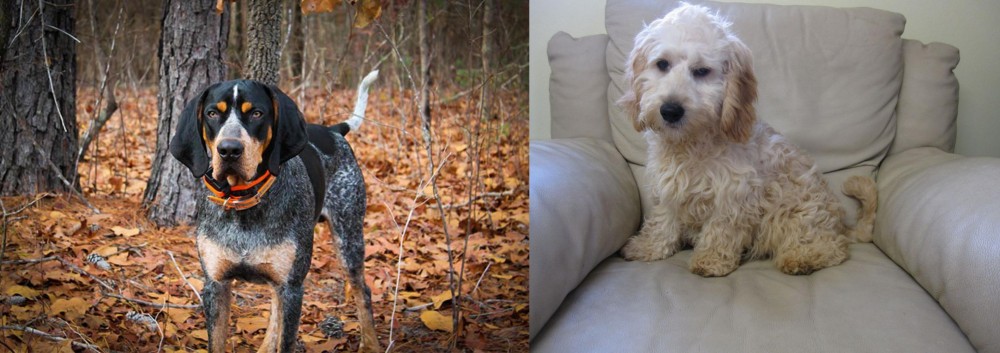 Both Bluetick Coonhound and Cockachon are originated from United States. Bluetick Coonhound may grow 30 cm / 12 inches higher than Cockachon. Bluetick Coonhound may weigh 27 kg / 60 pounds more than Cockachon. Bluetick Coonhound may live 3 years less than Cockachon. Both Bluetick Coonhound and Cockachon has almost same litter size. Bluetick Coonhound requires Moderate Maintenance. But Cockachon requires Low Maintenance
Both Bluetick Coonhound and Cockachon are originated from United States. Bluetick Coonhound may grow 30 cm / 12 inches higher than Cockachon. Bluetick Coonhound may weigh 27 kg / 60 pounds more than Cockachon. Bluetick Coonhound may live 3 years less than Cockachon. Both Bluetick Coonhound and Cockachon has almost same litter size. Bluetick Coonhound requires Moderate Maintenance. But Cockachon requires Low Maintenance
 Bred to be hunting dogs, for a long time the Bluetick Coonhound was referred to as the English Coonhound.The Bluetick Coonhound is actually one of 6 recognized breeds of Coonhound, and they were all developed in the United States. In 1945, breeders broke away from their English counterparts, renaming the larger dog to Bluetick Coonhound.
Bred to be hunting dogs, for a long time the Bluetick Coonhound was referred to as the English Coonhound.The Bluetick Coonhound is actually one of 6 recognized breeds of Coonhound, and they were all developed in the United States. In 1945, breeders broke away from their English counterparts, renaming the larger dog to Bluetick Coonhound.
Not much is known of their origins but it seems as though with selective breeding between French Hounds, Foxhounds and English Coonhounds, the Bluetick Coonhound was produced. Originating in the United States of America, it was in 2008 that he Bluetick Coonhound was recognized by the AKC in the Miscellaneous Class.
 The Cockachon is not a pure bred dog but rather a cross between the Cocker Spaniel and the Bichon Frise. Very little if anything is known about who initially developed the Cockachon. It is known that the International Designer Canine Association (IDCA)registered and recognized the hybrid in 2009.
The Cockachon is not a pure bred dog but rather a cross between the Cocker Spaniel and the Bichon Frise. Very little if anything is known about who initially developed the Cockachon. It is known that the International Designer Canine Association (IDCA)registered and recognized the hybrid in 2009.
It is obviously a relatively new cross breed. The hybrid is also recognized by the American Canine Hybrid Club (ACHC), International Designer Canine Registry (IDCR) and the Designer Dog Kennel Club (DDKC).
 This is a medium to large dog that sports a dark blue and white coat which is densely mottled or ticked. The Bluetick Coonhound’s coat can be described as tri-colored, and the dog’s head and ears are essentially black. He can also have tan markings on the chest, below the tail, around the muzzle and over the eyes. The dog is muscular and athletic and weighs from 25 to 36kg. Typically of the Hound breed, he has a sad but amicable expression on his face.
This is a medium to large dog that sports a dark blue and white coat which is densely mottled or ticked. The Bluetick Coonhound’s coat can be described as tri-colored, and the dog’s head and ears are essentially black. He can also have tan markings on the chest, below the tail, around the muzzle and over the eyes. The dog is muscular and athletic and weighs from 25 to 36kg. Typically of the Hound breed, he has a sad but amicable expression on his face.
The Bluetick Coonhound is an intelligent dog and once he has been trained and socialized, he becomes a wonderful member of the family, getting on well with children and other pets He will need plenty of companionship from his human family as well as exercise, and isn’t a dog that you can just have stuck away in your back garden. A Bluetick needs plenty of companionship and activity to be happy.
Friendly and social, this is a vocal dog, given to baying, barking and howling. He’s a scenthound, so when you take him for a walk, which is essential for his exercise needs, you may need him on a leash as he can get scent of something and just be off. You’ll also need to ensure you have a fenced yard as he looks for ways to get out to follow a scent.
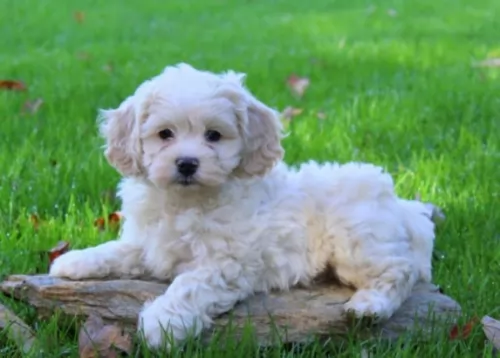 The Cockachon is a cute, little dog very popular in current times. He is small, compact, dark eyes, a round head and black nose. He has a baby face and fluffy hair. It has a furry tail and a blunt muzzle.
The Cockachon is a cute, little dog very popular in current times. He is small, compact, dark eyes, a round head and black nose. He has a baby face and fluffy hair. It has a furry tail and a blunt muzzle.
The Cockachon is a mix between the American Cocker Spaniel and the Bichon Frise. In order to get a better idea of what the hybrid can look like just look at the individual parents. The American Cocker Spaniel is a small dog with a short muzzle and domed head. It is in the Sporting Group, but it is the smallest member of the group. He has a compact, sturdy body and though domed his head is refined.
The Cocker’s stance includes a sloping topline, muscular hindquarters and strong shorter legs adds up to a balanced canine. The coat can be in a wide variety of colors including liver, golden, black, and red. Also, it could be liver and tan, black and tan, roan or tricolors. So, while the Bichon Frise is always white the Cockachon can be any of these colors including white. The types of coats that the Cocker Spaniel and the Bichon Frise have are very different as well.
The Bichon Frise is also a small dog, actually smaller than the American Cocker. The Cockachon usually ends up being about the size of the Bichon at 5-10 kg in weight and 23-30 cm in height. The skull of the Bichon Frise is round rather than domed and the muzzle is also rounded. The tail is long and curly while the Cocker would usually have a cropped tail. The nose and eyes of the Bichon Frise are black and its hair is dense and curly. Unlike the Cocker Spaniel it barely sheds.
Many Cockachon have floppy ears, curly coats and come in any variety of colors though many, many are white.
 The Bluetick Coonhound is an affectionate dog who will do well in the country, although he will adapt to city dwelling too. Wherever he is, he will need plenty of activities to keep him busy.
The Bluetick Coonhound is an affectionate dog who will do well in the country, although he will adapt to city dwelling too. Wherever he is, he will need plenty of activities to keep him busy.
People living on smaller properties may have reservations about keeping one, as his bark is loud and long winded, whereas a larger property would accommodate this characteristic better.
Your Bluetick can make a wonderful pet if he is trained and socialized. He is just like a big teddy bear who wants to be part of the family and receive his full portion of love and care like everyone else.
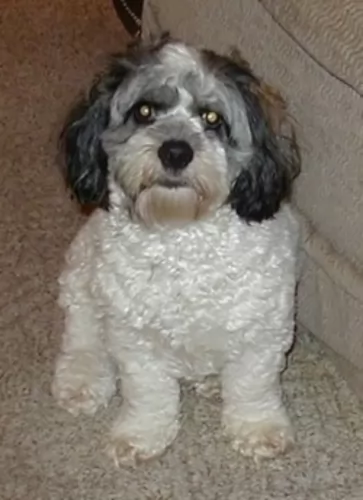 People created the Cockachon to get a small, lap or carry dog that had certain characteristics. These characteristics included a very social, loving dog. He is active and friendly, sweet and gentle. He is loyal, and loves being loved. He is great with other dogs and you can trust him with your children. He is a little independent but very loyal.
People created the Cockachon to get a small, lap or carry dog that had certain characteristics. These characteristics included a very social, loving dog. He is active and friendly, sweet and gentle. He is loyal, and loves being loved. He is great with other dogs and you can trust him with your children. He is a little independent but very loyal.
Like many little dogs he can have serious separation anxiety. Crate training is recommended so that he has a place to feel safe when you are not with him.
 You won’t battle with too many vet’s fees for your Bluetick Coonhound as he is a healthy breed. Just like with other dogs, especially in larger dogs, watch out for hip and elbow dysplasia.
You won’t battle with too many vet’s fees for your Bluetick Coonhound as he is a healthy breed. Just like with other dogs, especially in larger dogs, watch out for hip and elbow dysplasia.
If you do research you’ll find that quite a few Coonhounds can be affected. It is when the hip or elbow socket is malformed. Check your pet because it can lead to painful arthritis and can cause lameness.
Typical of Hounds, your Bluetick Coonhounds loves to eat, and this is precisely why he is prone to over-eating if you allow him to. Watch your dog’s weight and don’t allow him to overeat as overeating suppresses the immune system, resulting in illness.
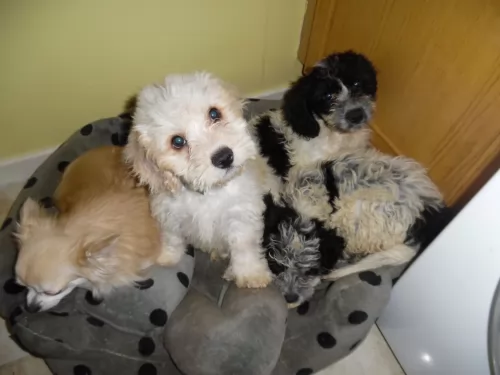 Hybrid dogs seldom have a lot of inherited diseases as they seem to jump a generation but if they do, it can be either a combination of both breeds issues or issues from just one of the breeds in the cross. For the Cockachon these issues include:
Hybrid dogs seldom have a lot of inherited diseases as they seem to jump a generation but if they do, it can be either a combination of both breeds issues or issues from just one of the breeds in the cross. For the Cockachon these issues include:
This loose kneecap issue is common to many small dogs and can cause lameness if not addressed.
Eyelid problems such as the ones that might bother a Cockachon can be found in many small dogs. These include Entropion and Ectropion.
 The puppy Bluetick will require 4 meals a day. Your adult Bluetick will require one or two bowls of food a day. This food can be your own home-made brand which includes rice, meat and vegetables or it should be a high quality commercially manufactured dog food. If you’re in any doubt as to what kind of dog food to be providing for your Bluetick Coonhound, rather speak to your vet as you want to ensure your pet is getting in his vitamins and minerals.
The puppy Bluetick will require 4 meals a day. Your adult Bluetick will require one or two bowls of food a day. This food can be your own home-made brand which includes rice, meat and vegetables or it should be a high quality commercially manufactured dog food. If you’re in any doubt as to what kind of dog food to be providing for your Bluetick Coonhound, rather speak to your vet as you want to ensure your pet is getting in his vitamins and minerals.
Good nutrition is essential to the health and wellbeing of your dog. It is important that he receive raw meat in his diet from time to time as well as a supplement with essential fatty acids to keep his health and skin in tip top condition. He should never ever be without a steady source of fresh, cool water.
When it comes to grooming, an occasional brushing will suffice. The dog has a short coat but it is dense and it sheds throughout the year. Use a brush on him to get rid of loose hairs and to keep his coat soft and shiny.
Active Hound breeds are prone to ticks and fleas so check your dog regularly for these parasites.
The medium length floppy ears will need to be checked. You can always check with your veterinarian for ear cleaning products and how to use them. Never prod around in your dog’s ears, trying to clean them, as this can lead to damage.
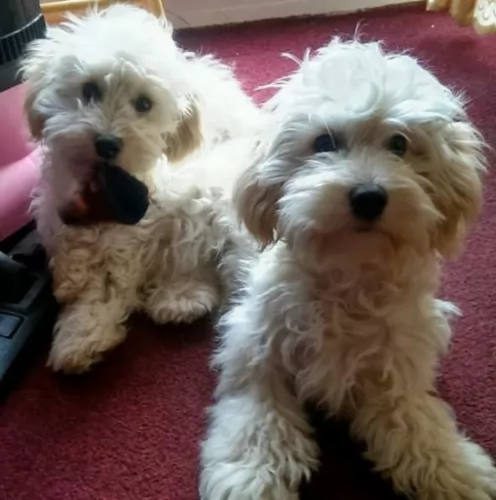 Don’t overfeed a Cockachon. Give him ¾ -1.5 cups of dry food of high quality in two meals per day.
Don’t overfeed a Cockachon. Give him ¾ -1.5 cups of dry food of high quality in two meals per day.
In addition to the issues listed above, the Cockachon is also prone to heart disease and cardiac issues.
The Cockachon has a lot of energy for its size. Make sure it gets plenty of exercise. If walks are the exercise of your choice make sure you walk him for 30 minutes a day. He loves to play, and a back yard would be nice. These little guys do well in obedience but are usually to small for agility.